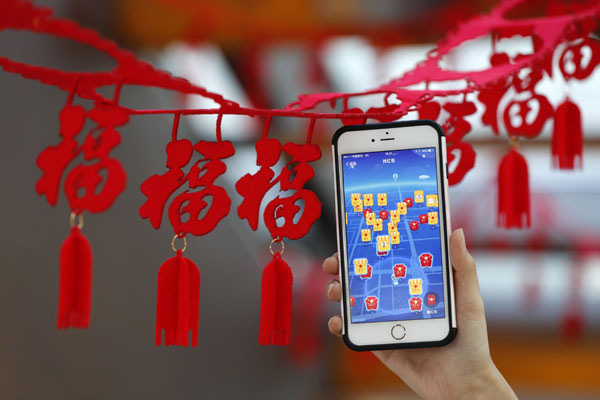Tech companies add Pokemon to festive fun
 |
|
A mobile phone user shows "red envelopes" from Alipay available nearby on his phone during a news conference earlier this month in Beijing. [Photo/Xinhua] |
Giving red envelopes containing gift money remains a tradition among Chinese people during the Spring Festival, and this year China's tech companies are adjusting to the digital age by adding Pokemon Go-inspired features to their mobile red envelope apps.
Alipay, the e-wallet from Ant Financial Services Group, has unveiled a location-based, augmented reality game that allows users to collect virtual red envelopes as they move around.
Through the app, users can scan with their smartphone cameras to hide the digital red envelopes, and then send clues to their friends to help them find them.
To promote the virtual game, Alipay has allocated 200 million yuan ($29.1 million) to encourage users who adopt the function.
By scanning the Chinese character Fu, which stands for luck and fortune, participants have a chance to receive one of the five designated lucky cards.
Those who collect all five cards by the eve of the Spring Festival on Jan 27 are entitled to a share of the 200 million yuan.
The game is designed to recreate the fun of childhood games involving searching for hidden objects and add a human touch to the holidays, said company executive Guan Hua.
A similar move was taken by Tencent Holdings Ltd, which combines lucky money with AR features through its QQ messenger.
Users who come within 100 meters of a clue marked on their map get to choose one of three virtual red packets. Only one contains prize money. Tencent promised 300 million yuan in incentives to players.
Companies are also using the red packet campaign as a digital marketing tool.
More than 20 brands including Coca-Cola, KFC and Uniqlo have teamed up with the tech giants to hide digital red envelopes with 30 million yuan worth of cash and coupons across their stores.
AR-enabled red packets are the latest endeavor by the internet duo who have turned the holiday tradition into a wildly popular phenomenon, helping them tap into the digital wallets of millions of Chinese.

















